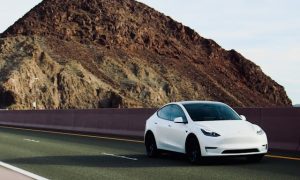
In recent years, businesses worldwide have increasingly embraced green initiatives as part of their operational strategies.
One notable area of focus is fleet management, where companies are seeking innovative solutions to reduce their carbon footprint and promote sustainability.
Electric cars play a pivotal role in these green initiatives, offering a myriad of benefits not only for the environment but also for employees.
The Environmental Impact of Electric Cars in Fleet Management

The transportation sector is a significant contributor to greenhouse gas emissions, and fleet operations are no exception. Traditional internal combustion engine (ICE) vehicles emit large quantities of carbon dioxide (CO2) and other pollutants, contributing to air pollution and climate change. Electric vehicles (EVs), on the other hand, produce zero tailpipe emissions, making them a cleaner alternative for fleet management.
By transitioning to electric cars, companies can significantly reduce their overall carbon footprint. For instance, a typical EV can save approximately 4.6 metric tons of CO2 annually compared to a conventional gasoline vehicle. When scaled across an entire fleet, this reduction can make a substantial impact on a company’s environmental goals.
Furthermore, electric cars are often more energy-efficient than their ICE counterparts. EVs convert about 60% of the electrical energy from the grid to power at the wheels, whereas conventional vehicles only convert about 20% of the energy stored in gasoline. This efficiency means less energy is required to travel the same distance, further decreasing the environmental impact.
Economic Benefits of Electric Fleets
While the initial investment in electric vehicles can be higher than traditional vehicles, the long-term economic benefits often outweigh the upfront costs. One of the most significant advantages is the lower operating cost. Electricity is generally cheaper than gasoline, and electricity is also more stable. This stability allows businesses to better predict and manage their fleet operating expenses.
Maintenance costs are another area where electric cars offer savings. EVs have fewer moving parts than ICE vehicles, which means fewer components can wear out or fail. As a result, businesses can expect lower maintenance and repair costs over the lifespan of an electric fleet.
Additionally, many governments offer incentives and rebates for businesses that adopt electric vehicles. These incentives can help offset the higher purchase price and accelerate the return on investment. By taking advantage of these financial incentives, companies can make the transition to electric fleets more economically feasible.
Enhancing Employee Benefits through Green Initiatives

Beyond the environmental and economic advantages, integrating electric cars into fleet management can also enhance employee benefits and satisfaction. One key benefit is the improvement of air quality in the workplace. Traditional fleet vehicles contribute to local air pollution, which can affect the health and well-being of employees. By switching to electric cars, businesses can help create a healthier environment for their workforce.
Moreover, many employees are increasingly valuing sustainability and environmental responsibility in their employers. By demonstrating a commitment to green initiatives, companies can attract and retain talent who prioritize these values. Employees are more likely to feel proud and motivated to work for a company that takes tangible steps to reduce its environmental impact.
Another significant benefit is the potential for lower commuting costs for employees who drive company vehicles. Electric cars are cheaper to operate and maintain, which can translate into direct savings for employees. Additionally, businesses can offer perks such as on-site EV charging stations, making it more convenient for employees to charge their vehicles during work hours.
Overcoming Challenges in Transitioning to Electric Fleets
While the benefits of electric cars in fleet management are clear, transitioning to an electric fleet does come with its challenges. One of the primary concerns is the availability of charging infrastructure. To ensure a smooth transition, businesses need to invest in sufficient charging stations to support their fleet. This investment includes not only the physical infrastructure but also the electrical capacity to handle the increased load.
Another challenge is the range limitation of electric vehicles. While EV technology has advanced significantly, range anxiety remains a concern for fleet operators. Careful planning and route optimization are essential to ensure that electric vehicles can meet the demands of daily operations without running out of charge.
Furthermore, the resale value of electric vehicles is still a developing market. Businesses need to consider the potential depreciation and future market conditions when making long-term investment decisions. However, as EV technology continues to improve and become more widespread, it is expected that the resale value of electric vehicles will stabilize and become more favourable.
The Future of Fleet Management with Electric Vehicles

The future of fleet management is undoubtedly leaning towards sustainability, and electric vehicles are at the forefront of this transition. As battery technology advances and charging infrastructure expands, the barriers to adopting electric fleets are gradually diminishing. Businesses that embrace this shift early on can position themselves as leaders in sustainability, gaining a competitive edge in an increasingly eco-conscious market.
Moreover, the integration of renewable energy sources, such as solar and wind power, with electric vehicle charging stations can further enhance the environmental benefits. By powering EVs with clean energy, companies can move closer to achieving a zero-emission fleet.
Conclusion
Green fleet management, driven by the adoption of electric cars, offers numerous advantages for businesses, the environment, and employees. By reducing greenhouse gas emissions, lowering operating costs, and enhancing employee satisfaction, electric vehicles present a compelling case for companies looking to implement sustainable practices.
While challenges remain, the continued advancement of EV technology and infrastructure promises a bright future for green fleet management. Embracing electric cars today will not only help protect the planet but also pave the way for a more sustainable and prosperous tomorrow.
![]()
Author Profile
- Online Media & PR Strategist
- Blogger and Educator by Passion | Senior Online Media & PR Strategist at ClickDo Ltd. | Fascinated to Write Lifestyle Blogs in News & Education I have completed a journalism summer course at the London School of Journalism and manage various blogs.
Latest entries
 Green Expert GuidesMarch 28, 2025Lisbon Living: Where Sustainable Charm Meets Urban Energy
Green Expert GuidesMarch 28, 2025Lisbon Living: Where Sustainable Charm Meets Urban Energy EnvironmentJanuary 21, 2025Buying Eco-Friendly Homes: 6 Eco Questions to Ask Your Real Estate Agent
EnvironmentJanuary 21, 2025Buying Eco-Friendly Homes: 6 Eco Questions to Ask Your Real Estate Agent BusinessJanuary 16, 202510 Benefits of used Office Furniture when Refurbishing an Office
BusinessJanuary 16, 202510 Benefits of used Office Furniture when Refurbishing an Office Best practicesJanuary 6, 2025Eco-Friendly Event Planning: Mastering Sustainable Waste Management for Holiday Celebrations
Best practicesJanuary 6, 2025Eco-Friendly Event Planning: Mastering Sustainable Waste Management for Holiday Celebrations






Leave a Reply
You must be logged in to post a comment.